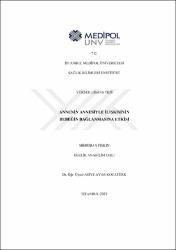| dc.contributor.advisor | Kocatürk, Asiye | |
| dc.contributor.author | Pişkin, Mihriban | |
| dc.date.accessioned | 2021-09-13T08:20:37Z | |
| dc.date.available | 2021-09-13T08:20:37Z | |
| dc.date.issued | 2021 | en_US |
| dc.date.submitted | 2021-01-11 | |
| dc.identifier.citation | Pişkin, M. (2021). Annenin annesi ile ilişkisinin bebeğin bağlanmasına etkisi. (Yayınlanmamış yüksek lisans tezi). İstanbul Medipol Üniversitesi Sağlık Bilimleri Enstitüsü, İstanbul. | en_US |
| dc.identifier.uri | https://hdl.handle.net/20.500.12511/8101 | |
| dc.description.abstract | Bu araştırma, anne-bebek bağlanmasında annenin kendi annesiyle ilişkisinin bağlanmayı nasıl etkilediğini belirlemek amacıyla yapılmıştır. İstanbul'da bir kamu hastanesinde Şubat-Nisan 2020 tarihleri arasında 0-1 yaş bebeği olan 289 anne ile yüz yüze görüşülerek veriler toplanmıştır. Tanımlayıcı olarak yapılan çalışmanın verileri, Bilgi Formu, Anne-Bebek Bağlanma Ölçeği (ABBÖ), Nesiller Arası Dayanışma Ölçeği (NADÖ) kullanılarak toplanmıştır. İstatistiksel analizler için NCSS 2007 programı kullanılmıştır. Niceliksel verilerin normal dağılım göstermeyen üç ve üzeri grubun karşılaştırmasında Kruskall-Wallis testi; iki grup karşılaştırmasında ise Mann-Whitney U Testi kullanıldı. Araştırmaya katılan annelerin yaş ortalaması 28,13 olup ölçekten alınan ortalama puan 54,43±7,15'dir. Annelerin çoğunluğu lise mezunu, yarısının ekonomik durumlarının normal olduğu ve ilk bebek sahibi oldukları görülmüştür. Çocukluğunu ailesi ile birlikte geçiren ve annesi ile iyi ilişkiler içinde olanların bebek bağlanmasının daha kolay olduğu görülmektedir. Katılımcıların %87,9'u annesinin yanında güvende olduklarını ifade etmektedir. Güven duygusunun olduğu yerde ikili ilişkiler olumlu yönde etkilemekte ve anne-bebek bağlanması aynı yönde doğru orantılı bir şekilde artmaktadır. Anne-bebek bağlanması ile tanımlayıcı özelikler, annenin doğumu, annenin doğum sonrası aldığı destek ve annenin çocukluğu arasında; yardım verme ve yardım alma arasında, Yapısal Dayanışma arasında; İlişkisel Dayanışma arasında, İşlevsel Dayanışma arasında; Duygusal Dayanışma arasında, Uzlaşımsal Dayanışma arasında; Normatif Dayanışma arasında ilişki vardır. 0-1 yaş bebek sahibi annenin kendi annesiyle var olan ilişkisi, bebek sahibi anne ile bebek arasında kurulacak bağlanma şeklini var olan ilişkiye paralel olarak olumlu veya olumsuz yönde etkilemektedir. Bağlanmanın nesiller arasında aktarıldığını ve kendi içinde devam ettiğini göstermektedir. Bunu değişebilmesi için ebelerin doğum sonu annelere güvenli bağlanma davranışının gelişmesini sağlamak için eğitim verilmesi gerekir. | en_US |
| dc.description.abstract | This study was conducted to determine how the mother's relationship with her own mother affects attachment in mother-baby attachment. A descriptive cross-sectional study was conducted in a public hospital in Istanbul between February and April 2020 by interviewing 289 mothers with 0-1-year-old babies. The data of the descriptive study werw collected using the Information Form, the Mother-Infant Attachment Scale (MIBS), and the Intergenerational Solidarity Scale (IGS). NCSS 2007 program was used for statistical analysis. Kruskall-Wallis test in comparison of three and more groups that do not show normal distribution of quantitative data; Mann-Whitney U Test was used in the comparison of the two groups. The average age of the mothers participating in the study is 28.13 and the average score obtained from the scale is 54.43 ± 7.15. Most of the mothers were high school graduates, half of them had normal economic conditions and had a first baby. It is observed that it is easier for those who spend their childhood with their family and who have good relations with their mother to attach a baby. 87.9% of the participants state that they are safe with their mother. Where there is a sense of trust, bilateral relations affect positively and mother-infant attachment increases in the same direction. Between mother-baby attachment and descriptive features, mother's birth, mother's postnatal support and mother's childhood; Between giving and receiving aid, between Structural Solidarity; Between Relational Solidarity, Between Functional Solidarity; Between Emotional Solidarity, Between Conventional Solidarity; There is a relationship between Normative Solidarity. The relationship of the mother with 0-1-year-old baby with her own mother affects the attachment type to be established between the mother and the baby in a positive or negative way in parallel with the existing relationship. It shows that the attachment is passed on between generations and continues within itself. In order to change this, midwives should be trained to ensure the development of secure attachment behavior to mothers after birth. | en_US |
| dc.language.iso | tur | en_US |
| dc.publisher | İstanbul Medipol Üniversitesi Sağlık Bilimleri Enstitüsü | en_US |
| dc.rights | info:eu-repo/semantics/openAccess | en_US |
| dc.subject | Bağlanma | en_US |
| dc.subject | Bağlanma Kuramı | en_US |
| dc.subject | Anne-Bebek Bağlanması | en_US |
| dc.subject | Ebeveyn-Bebek Bağlanması | en_US |
| dc.subject | Ebelik | en_US |
| dc.subject | Attachment | en_US |
| dc.subject | Attachment Theory | en_US |
| dc.subject | Mother-Infant Attachment | en_US |
| dc.subject | Parent-Infant Attachment | en_US |
| dc.subject | Pregnancy | en_US |
| dc.title | Annenin annesi ile ilişkisinin bebeğin bağlanmasına etkisi | en_US |
| dc.title.alternative | The effect of the mother's relationship with the mom onbaby attachment | en_US |
| dc.type | masterThesis | en_US |
| dc.department | İstanbul Medipol Üniversitesi, Sağlık Bilimleri Enstitüsü, Ebelik Ana Bilim Dalı | en_US |
| dc.relation.publicationcategory | Tez | en_US |


















